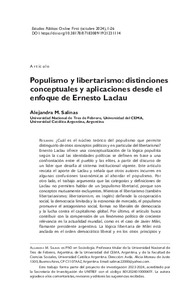Please use this identifier to cite or link to this item:
https://repositorio.uca.edu.ar/handle/123456789/19072| Título: | Populismo y libertarismo: distinciones conceptuales y aplicaciones desde el enfoque de Ernesto Laclau Populism and libertarianism: conceptual distinctions and applications using Ernesto Laclau’s approach |
Autor: | Salinas, Alejandra M. | Palabras clave: | Laclau, Ernesto, 1935-2014; POPULISMO; LIBERTARISMO; TAXONOMIA; Milei, Javier, 1970- | Fecha de publicación: | 2024 | Editorial: | Centro de Estudios Públicos | Resumen: | ál es el núcleo teórico del populismo que permite
distinguirlo de otros conceptos políticos y en particular del libertarismo?
Ernesto Laclau ofrece una conceptualización de la lógica populista
según la cual las identidades políticas se definen en base a una
confrontación entre el pueblo y las elites, a partir del discurso de
un líder que desafía al sistema institucional vigente. Este artículo
rescata el aporte de Laclau y señala que otros autores incurren en
algunas confusiones taxonómicas al abordar el populismo. Por
otro lado, el trabajo argumenta que las categorías y definiciones de
Laclau no permiten hablar de un ‘populismo libertario’, porque son
conceptos mutuamente excluyentes. Mientras el libertarismo (también
libertarianismo; libertarianism, en inglés) defiende la cooperación
social, la democracia limitada y la economía de mercado, el populismo
promueve el antagonismo social, formas no liberales de democracia
y la lucha contra el capitalismo global. Por último, el artículo busca
contribuir con la comprensión de un fenómeno político de creciente
relevancia en la actualidad mundial, como es el caso de Javier Milei,
flamante presidente argentino. La lógica libertaria de Milei está
anclada en el orden democrático liberal y en los otros principios y normas establecidos en la Constitución, por lo cual resulta incorrecto
considerarlo como un líder populista si adoptamos el enfoque de Laclau. at is the theoretical core of populism that allows it to be distinguished from other political concepts, and in particular from libertarianism? Ernesto Laclau offers a conceptualization of the populist logic according to which political identities are defined on the basis of a confrontation between the people and the elites, based on the discourse of a leader who challenges the current institutional system. This article rescues Laclau’s contribution and points out that other authors incur in some taxonomic confusions when addressing populism. Besides, the paper argues that Laclau’s categories and definitions do not allow us to speak of a ‘libertarian populism’ because they are mutually exclusive concepts. While libertarianism defends social cooperation, limited democracy and the market economy, populism promotes social antagonism, non-liberal forms of democracy and the fight against global capitalism. Finally, the work seeks to contribute to the understanding of a political phenomenon of growing relevance in the world today, such as the case of Javier Milei, the new Argentine President. Milei’s libertarian logic is anchored in the liberal democratic order and in the other principles and norms established in the Constitution, which is why it is incorrect to consider him a populist leader if we adopt Laclau’s approach. |
URI: | https://repositorio.uca.edu.ar/handle/123456789/19072 | ISSN: | 0718-3089 (online) 0716-1115 (impreso) |
Disciplina: | CIENCIA POLITICA | DOI: | 10.38178/07183089/1921231114 | Derechos: | Atribución-NoComercial-CompartirIgual 4.0 Internacional | Fuente: | Estudios públicos. 2024 (1) |
| Appears in Collections: | Artículos |
Files in This Item:
| File | Description | Size | Format | |
|---|---|---|---|---|
| populismo-libertarismo-distinciones.pdf | 673,53 kB | Adobe PDF |  View/Open |
This item is licensed under a Creative Commons License

